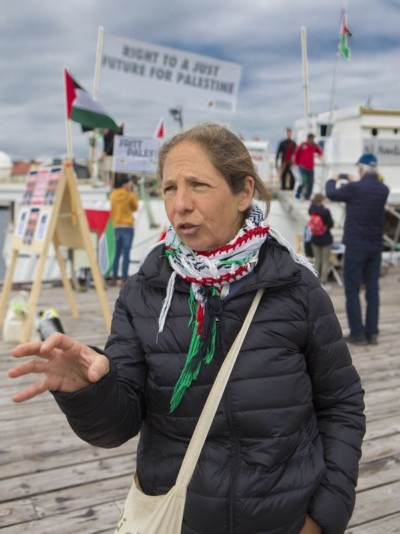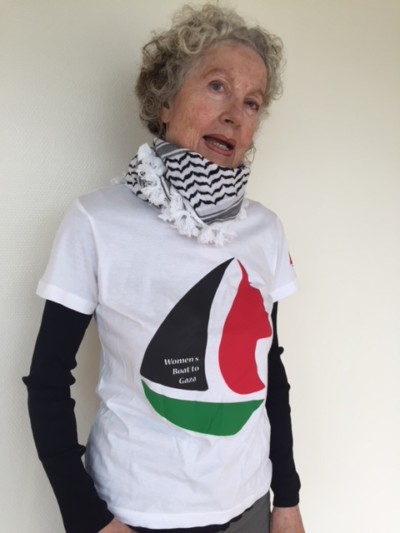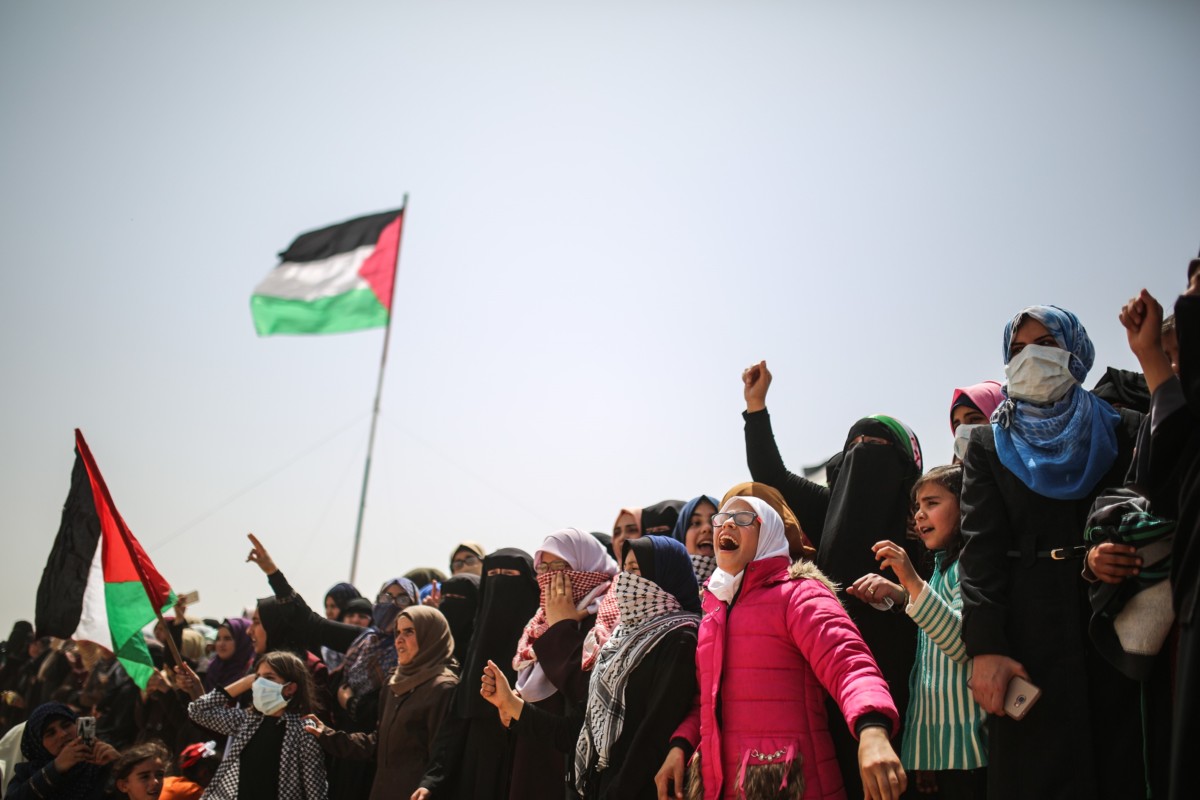Freedom Flotilla Sails Again to Gaza in Support of the Palestinian Great March of Return
This year marks the 70th anniversary of the Nakba (the catastrophe), in which approximately 800,000 Palestinians were expelled from their homes by Zionist militias. On May 14, 2018, Israel’s independence day and one day before the concurrent occasion of the Nakba anniversary, the world witnessed a dystopian reality of split screens that displayed Israeli officials engaged in celebrations during the opening ceremony of the US embassy in Jerusalem, as Israeli troops massacred dozens of Palestinians near the border fence to Gaza during the Great March of Return.
The international Freedom Flotilla Coalition (FFC) is a grassroots, nonviolent effort aimed at expressing solidarity with the Palestinian people and coordinating local campaigns that challenge Israel’s decade-old siege of the Gaza strip. The FFC made headlines in 2010, when it was raided by Israeli Navy commandos who killed nine activists and injured more than 50, causing international outrage.
The FFC set sail from Norway to Gaza several days ago and will stop at about a dozen ports, among them Cadiz, Spain, on June 23 just before entering the Mediterranean Sea.
Zohar Chamberlain Regev is an Israeli citizen who lives in Spain. Chamberlain Regev is the owner of the Women’s Boat to Gaza Zaytouna-Oliva, seized in 2016, and the object of ongoing court proceedings in Israel. She has participated in the coordination of Rumbo a Gaza, the Spanish component of the Freedom Flotilla, since 2012, and is the FFC’s boat leader on board Al-Awda (The Return) — the flotilla for 2018.
Gerd von der Lippe is a professor at the University of Southeast Norway, specializing in media, sports (with a focus on the Middle East), gender and politics.
In this interview, Regev and von der Lippe discuss their hopes and fears for the Al-Awda Freedom Flotilla.
Yoav Litvin: What are your goals for the Freedom Flotilla in 2018?
Zohar Chamberlain Regev: We aim to send a message of solidarity to the Palestinian people and raise awareness regarding the crimes against humanity committed by Israel in Gaza. I believe the international community should sanction Israel to uphold human rights.
Gerd von der Lippe: To promote the end of the illegal military blockade of Gaza by sea, air and land, and to raise awareness of the terrible situation of Palestinian fishermen. We focus on justice for Palestinian people and on promoting the right of return for all refugees to their homes and properties from which they were expelled in 1948 by Zionist militias. We aim to show all the citizens of Gaza that we support their fight against the aggressive collective punishment of the Israeli Occupying Forces (IOF).
What are your expectations and fears? Describe your previous experience.

Regev: I have been involved with the organization for six years, but never sailed the entire route. As an Israeli citizen, I am curious how I will be received in Gaza by Palestinians. In case we are intercepted by the IOF, I expect rough treatment, but hope to be able to convey that we are nonviolently protesting against the blockade, not against Israeli people. We actually have Israelis’ best interests at heart.
von der Lippe: In 2012, I was chosen as the deputy leader of Ship to Gaza Norway and took part in different meetings in Athens. I was on the flotilla in parts of the last leg in 2015, on two other vessels that year in the Mediterranean, and in Messina in 2016.
I look forward to the last leg of the journey with people from the entire world who share my values. I am excited to listen and learn from their narratives and experience the joys of working together on our boat to the sound of the waves.
I fear that the IOF will strip us naked, humiliate us and shout at us that we are terrorists. In order to overcome my apprehensions, I use a technique I picked up from a former elite sports coach that enables me to remain in a sort of bubble, which shuts out all unpleasant and humiliating words and actions. Perhaps I will be able to teach this technique to others before we are in any kind of danger.
How does the flotilla play into recent events, i.e. the Great March of Return? Is there some coordination/collaboration?
Regev: One of our boats is called Al-Awda (The Return), [al]though we did not coordinate it with the organizers of the Great March of Return (though at least one of our partners is involved with it). This is our way to acknowledge the fact that we sail in 2018 on the 70th anniversary of the Nakba. It is important to understand the situation of the Palestinians in Gaza in the context of long-term displacement and occupation.

von der Lippe: The Great March of Return in Gaza is a nonviolent Palestinian demonstration. I am deeply involved and have written about it in Norwegian newspapers. The march and the flotilla have the same aim: A focus on the Palestinian demand of return, Al-Awda.
What is the importance of nonviolent resistance to Israel? How do you compare it to the violent Palestinian struggle?
Regev: We choose a nonviolent resistance as a means to protest injustice. We support our Palestinian sisters and brothers in their demands and that their human rights be respected. Recent events show that Israel responds with live ammunition to Palestinian nonviolent protest, but Palestinians bravely persist, and so should we.
von der Lippe: I was born in Norway during the second World War and was raised on a culture and feeling of resistance. Nonviolent actions are the best tactic for us. Everything that the flotilla has launched has been grounded theoretically and practically within the framework of nonviolence. In addition, because we work against the military [blockade] of Gaza, some journalists associate us with Hamas. However, we are people who work within the decrees of the United Nations. We live outside Gaza, the West Bank and East Jerusalem, while Palestinians live in hell. How can we blame them? We support them in a way we are able to, as free humans.
Please discuss your research in Gaza. What do you hope to achieve?
von der Lippe: I teach sport politics at the University of Southeast Norway. Throughout my years of activism, I made wonderful friends in the [Islamic] University of Gaza, many of whom are football (i.e. soccer) players, and their families. Soccer is in the DNA of politics in the Middle East.
I collected qualitative interviews with soccer players in Gaza during the Israeli bombing in 2008-2009. Thus, I discuss the narratives of the Gaza soccer players, while I include and compare [to] narratives of Israeli soccer players who have paid coaches, are able to travel, play on well-built fields, and so on.
As a professor and academic, I am not a fundamentalist. I always engage in a constructive dialogue with students. I learn a lot by listening to them and use this knowledge in my speeches outside the university. I have also conducted research on women soccer players in the West Bank and am planning to study those in Lebanon and Jordan, if possible.
As an Israeli, what are some of the unique considerations you made prior to joining the flotilla? Are there threats from the Israeli government that concern you?
Regev: I have reason to believe the Israeli authorities are very much aware of my involvement and suspect they will treat me harshly if the boat is stopped. The way I see it, the only valid way to protect the interests of Jewish people anywhere, but mainly in Israel, is criticizing the ongoing violation of human rights.
Please discuss the educational activities that are part and parcel of the flotilla (e.g. during the various stops)? What aspects are you personally involved in, and their importance?
Regev: Our mission is stopping in as many ports as possible in order to reach out to different people, inform them about the situation in Palestine in general, and Gaza in particular, and encourage as many as possible to follow us, as well as apply pressure on their own governments to hold Israel accountable for its policy of human right violations.
As a boat leader, throughout the trip I talk to people who come by the boat, including journalists. These direct encounters are very important as they help put a human face not only on our mission, but also hopefully [on] the besieged Palestinians, as we always insist this is a civil society to civil society mission.
von der Lippe: The flotilla is dependent on support from local groups in each port. They help us dock in the port, collect supporters and contribute to the awareness of the terrible situation of the Palestinian people in Gaza. For example, when the ship was in Kristiansand (my home town) on May 6, Palestinian people and representatives from the Norwegian Palestine Committee arranged our speeches and contributed to some cultural activities.





Geen opmerkingen:
Een reactie posten